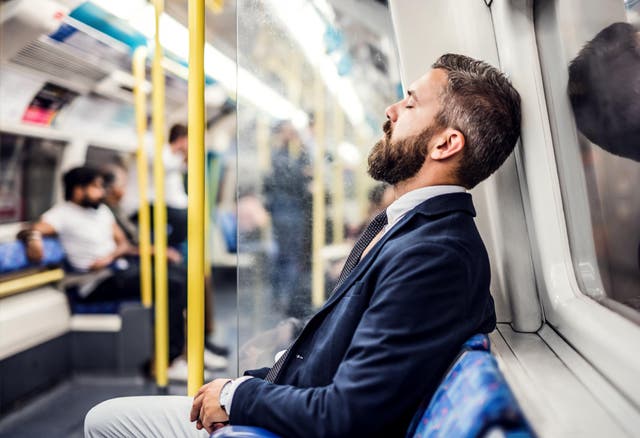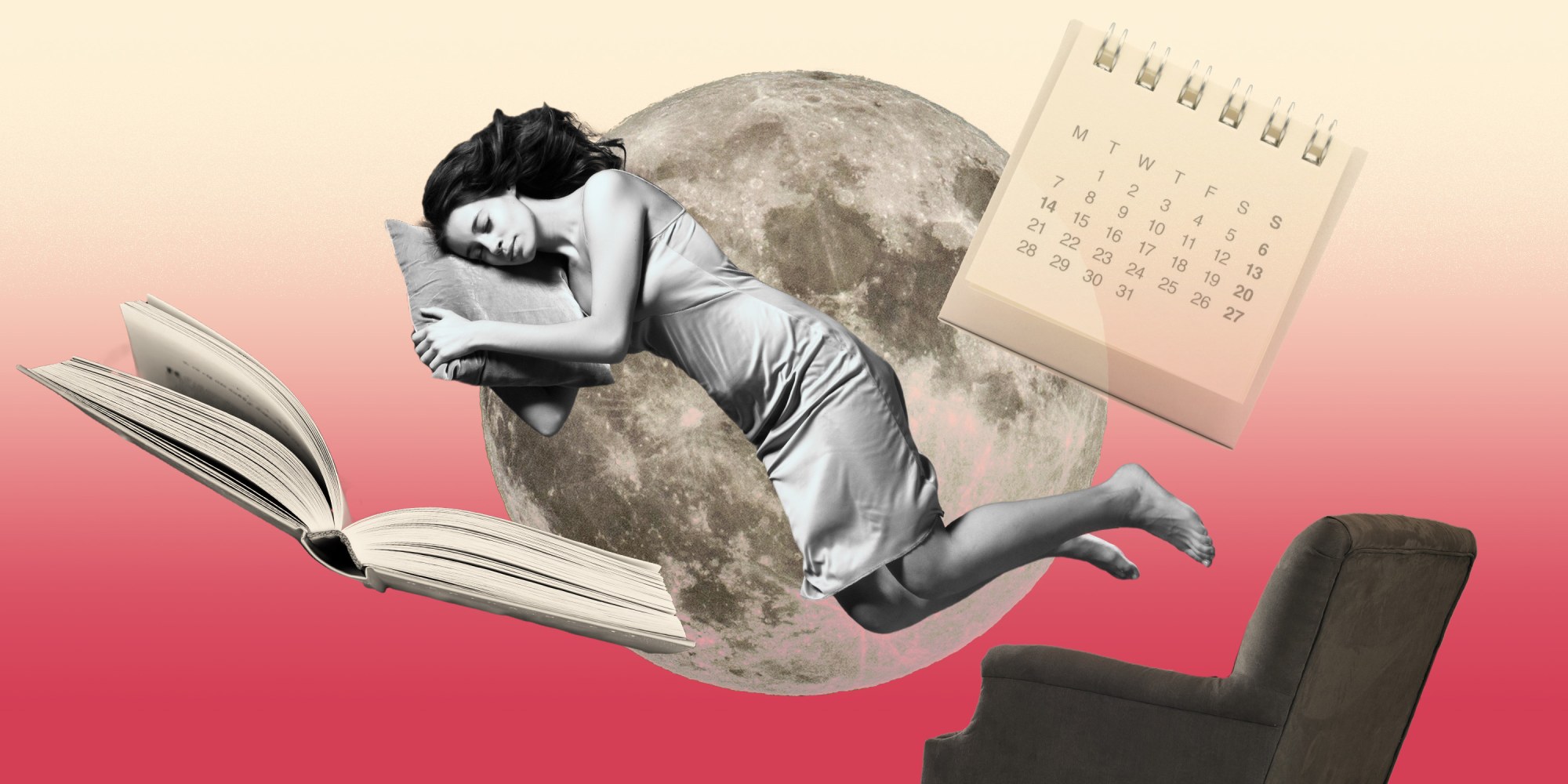Sleep is essential, and most of us drift off into slumber without a second thought. But if you have an uneasy relationship with sleep, you've likely experienced endless nights troubled by insomnia. Aside from feeling exhausted, the accumulated effects of sleep deprivation can be significant.
Understanding the causes of insomnia and how you can best manage sleep patterns can help resolve this exasperating problem. To find out more about insomnia causes, symptoms and treatment, we spoke to Sleep Psychologist Katherine Hall.
What is insomnia?
Insomnia is a common sleep disorder that most people experience at one time or another. 'If you struggle with insomnia, you might find it difficult to fall asleep or stay asleep - or both!' says Hall.
Insomnia occurs on a sliding scale, affecting individuals differently. 'Symptoms can vary for someone over time, depending on external factors and how proactive they are in treating their insomnia,' she adds.
It's not only night-time symptoms that be problematic. During the day, you may have trouble with your usual activities due to the lack of sleep. 'You aren't getting the sleep you need for your mind and body to function optimally,' explains Hall.
As a low estimate, 10% to 30% of adults live with chronic insomnia, although this figure jumps to 30% to 48% in older people and is as high as 50% among pregnant women. It can be a short-term issue, lasting up to three months. Or, for the unlucky few, it's a chronic problem, lasting much longer.
Photo credit: Prostock-Studio - Getty Images
What causes insomnia?
There's a range of factors that may bring on a sleepless night, from having a lot on your mind through to underlying medical conditions. Some people find sleeping in a room that's too hot or cold, alcohol, caffeine, and drugs can cause insomnia. Other insomnia causes include the following:
• Stress
When we experience stress in our lives, particularly when it's over a long period, it can lead to insomnia, says Hall. 'When you're stressed, your body and mind are on high alert, looking for danger and ready to take action,' she adds. 'This fight or flight state is important for human survival, but it's not helpful when you need to sleep!
• Work schedule or jet lag
Your circadian rhythm, or body clock, regulates many functions like hunger, temperature, hormone production, and sleep. If your circadian rhythm gets disrupted, so does your rest. 'Those who work shifts are likely to find their circadian rhythm is disrupted,' says Hall. 'They may work long hours, which change regularly, meaning the time when they sleep varies.'
A consistent bedtime is vital for restful sleep. Your body doesn't like it when it can't sleep at the same time each night. The same happens with jet lag. If you fly into a different time-zone, your body may have trouble adjusting, and sleep suffers.
• Poor sleep hygiene
Sleep hygiene has nothing to do with being dirty or clean. 'It refers to positive habits we use to help us sleep. Poor sleep hygiene can lead to issues trying to sleep,' says Hall.
Good sleep hygiene means having an environment and schedule that promotes regular, uninterrupted sleep. Having an inconsistent bedtime and waking up at any old time are poor behaviours as your body prefers a routine.
Make your bedroom a relaxation palace, free of distractions. This means no brain-stimulating activities, like watching TV or playing on your phone.
'You can become accustomed to being awake in the bedroom, rather than associating it with sleep, which keeps the cycle of insomnia going,' adds Hall. Instead, follow a relaxing pre-bed routine, like having a bath and reading a book.
• Mental health
Sleep disorders are common in people who have mental health issues. 'Mental illnesses of any kind can make it difficult to fall asleep at night. This can include anxiety, depression, mood disorders such as bipolar disorder, and more,' says Hall.
'It's difficult to relax when you're stuck in a tense state or have a lot on your mind, and at night, when there are no distractions and when everything else is quiet, it can sometimes cause your thoughts to feel louder and overwhelm you.'
Medications used to treat conditions like depression and anxiety can also cause insomnia.
• Health conditions
Some health problems can cause and significantly worsen insomnia. These include chronic pain, sleep apnea, overactive thyroid, gastrointestinal reflux disease (GERD), or chronic obstructive pulmonary disease (COPD).
'Individual symptoms of the conditions can interrupt sleep, such as needing to get up to go to the toilet or having disorders that cause uncontrollable movements or pain,' says Hall.
• Pregnancy insomnia
Both the hormonal changes and practical considerations of expecting a baby can lead to pregnancy insomnia.
'When you're pregnant, you're likely to struggle with a frequent need to urinate, even during the night,' says Hall. 'Leg cramps are common, along with an increase in the chance of restless leg syndrome. That's not even considering the worries and stress about the prospect of being a mother!'
Insomnia symptoms
The primary insomnia symptom is disrupted sleep, although you could also experience the following:
Problems getting to sleep or staying asleep.
Poor sleep quality.
Fatigue or sleepiness during the day.
Low energy and motivation.
Concentration, focus, memory, and attention span are affected.
Worries and anxiety about sleep.
Headaches and gastrointestinal symptoms.
Mood disturbances like feeling low, irritability, anger, increased stress, or impulsiveness.
People may turn to alcohol or medications to help them sleep. They may also be more accident-prone or even have car accidents.
How much sleep do we need?
The answer to how much sleep people need depends on the individual. 'As we grow from babies to adults, we're constantly developing and learning,' says Hall.
At different life stages, we need varying amounts of sleep, but according to Hall we need roughly the following amounts:
Babies: infants have the most extreme needs, sleeping as much as 17 hours a day until they're six months old. Then, they get by on 14 or so.
Toddlers: older babies need around 12-15 hours sleep.
School-aged children: older children need 10-12 hours sleep.
Teenagers: teens need around 8-10 hours sleep.
Adults: most adults need 7-9 hours sleep.
The older we get, the less sleep we require. Fundamentally, as individuals with unique lives, our sleep needs vary.
Home remedies to beat insomnia
Insomnia usually improves by changing your sleep habits. 'The key to getting the best sleep possible is to allow yourself adequate total sleep time,' says Hall.
Here are some things you can do to improve your sleep:
✔️ Consistency is key
Get up at the same time every morning. If you do this for a sufficient number of days, you will adjust your inner clock and get tired when you need to. 'Establishing a routine is essential,' says Hall. 'You should keep your bedtime and wake time as consistent as possible. Yes, even on weekends!'
✔️ Technology cut-off time
If you're working from home, the line between work and downtime can be blurred. Constantly checking emails and scrolling through social media can amount to excessive screen time. 'Give yourself a technology cut-off time - I'd recommend at least 60 minutes before bed,' recommends Hall.
✔️ Exposure to natural light
Getting outside in the natural light is beneficial for regulating your circadian rhythm and your sleep. Try to spend time outside every day, even in the cold and rain.
✔️ Exercise
Take regular exercise, but avoid exercising shortly before bed. 'Exercising, ideally a few hours before sleep, to wear your body and mind out healthily can help with sleep,' says Hall.
✔️ Sleep environment
Make your bedroom a calming space, optimised for sleep, with a comfortable, supportive bed. A simple, economical step is to add a mattress topper to increase your comfort levels.
✔️ Avoid stimulants
Coffee, tea, and other caffeinated drinks are stimulating. 'The general rule is to try not to have anything containing caffeine six hours before going to bed. If you do fancy a hot drink during this period, try herbal teas or decaffeinated drinks instead,' advises Hall.
✔️ Herbal sleep remedies
Some people find herbal remedies get them off to sleep better than other treatments – for example using passiflora, valerian or lavender aromatic oils as aromatherapy can aid relaxation prior to sleep.
Insomnia treatment from your doctor
Most people can overcome insomnia by changing their sleeping habits. If this doesn’t work and you still have regular sleep problems or find you're frequently struggling to stay awake during the day, make an appointment to see your doctor.
A GP will try to find out what is causing the insomnia to make sure you receive the right treatment. They may refer you to a therapist for Cognitive Behavioural Therapy (CBT) to improve the thoughts and behaviours preventing you from sleeping. 'CBT for insomnia is the first line of treatment for insomnia,' says Hall. This psychological therapy helps address thinking patterns and behaviours that contribute to insomnia.
Other treatment options may include counselling, medication, and melatonin, although not generally recommended.
Insomnia and sleeping tablets
Sleeping tablets are sedatives that are sometimes prescribed if you suffer from insomnia. They can be helpful in the short term but it is important not to use sleeping pills too often or for too long, as you may become dependent on the medicine and find it very difficult to stop taking the tablets. For more on sleep read our guide to beating insomnia and the 12 best sleep apps.
https://uk.style.yahoo.com/t-sleep-everything-know-insomnia-124300777.html








